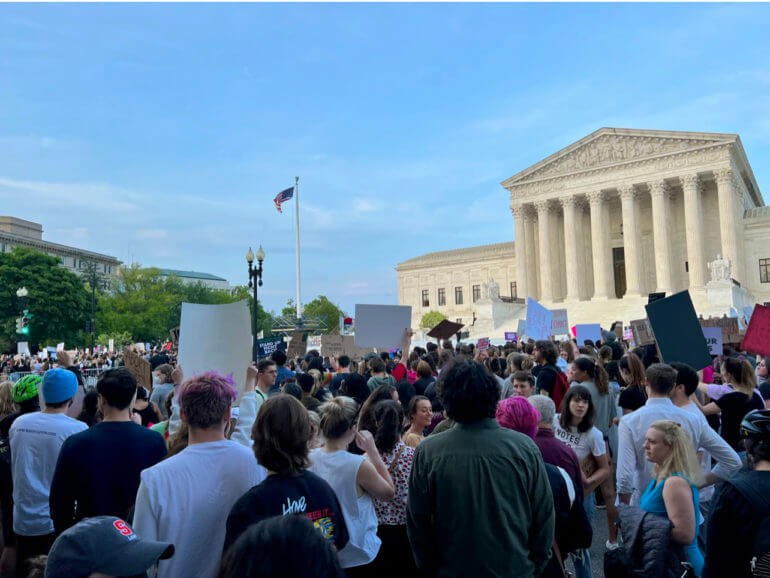
During The Raging Abortion Debate, I Take Solace In Being An Orthodox Jew
As a secular Jewish American young woman, I was raised to be a feminist. I went through a stage in middle school where I exclusively called God “She,” even though I wasn’t sure if there was a God. I was always one of the loudest and most outspoken students in any class that I was in. (Apparently, I was absent the day they taught girls to sit down and not take up space.) And I was unabashedly and unwaveringly pro-choice. In sixth grade, I spent most of a sleepover at a pro-life Catholic friend’s house attempting to persuade her to join my abortion position. “The fetus isn’t a life,” I explained. “It’s just a clump of cells, like what I have in my finger.”
My sense of female empowerment never faded, and as I got older I became an Orthodox Jew. I learned how Jewish law has a complex approach to viewing many controversial matters, including abortion. I started having children. I saw them on 3D ultra-sounds. Admittedly, they looked much more human than a clump of cells. My position on abortion entered more of a grey territory. I saw how an Orthodox rabbi ruled that a relative of mine should have an abortion after her doctor discovered that the fetus was developing without a top to his head. While my relative would have physically been able to carry the baby to term – which would have immediately died at birth – the rabbi ruled that the emotional toll would have been too much for the mother to bear. I was relieved that she had received such a ruling and was able to terminate the pregnancy.
With Roe V. Wade recently struck down, most conversations I see in media and social media distill abortion into pro-life or pro-choice positions, but the American political framing of this issue creates a lot of black and white rhetoric that usually lacks nuance. In matters of protecting personal freedoms and potential life, there are serious considerations on both sides. There are a wide range of places where these priorities can be at odds with one another. And downplaying the complexity of the issues isn’t helpful.
There are obvious theoretical extremes on both sides that produce easy answers. The life of the mother should obviously be protected if the fetus is endangering it. Full term abortion used as birth control is highly problematic and should be prevented. But what about all of the grayer questions in between? How do you deal with thorny issues? For me, trusting in a system of laws that I believe are not only God-given, but are well thought out, full of wisdom and nuance, gives me incredible comfort in terms of wading through political conversations as well as if that issue should ever become something I’d personally have to deal with. Not only do our sources themselves grapple with complexity, baked into the process of Jewish law is a system of every person getting to choose their own spiritual leader, their own decisor of halacha. There are a limit to our laws, of course. There are certainly lines we don’t cross. But to be able to find the spiritual leader who aligns with your world view is a form of being pro-choice in the self-actualized sense, and I don’t take any of that for granted.
From an American legal standpoint, these questions will now go legislatures. The people will decide state by state. That could mean that on both extremes, laws could come out in ways that don’t reflect the nuance that I believe Judaism is so deft at executing. I don’t have easy answers with how to approach this topic from a political point of view and being that this debate has been raging for decades, I don’t think anyone else has them either. Perhaps more Americans could open up our sacred books to learn about the balance we strike in these complex matters. We have thousands of years of wisdom that can be unpacked.
If you found this content meaningful and want to help further our mission through our Keter, Makom, and Tikun branches, please consider becoming a Change Maker today.








11 comments
Sort by
Thanks for a thoughtful article, Allison. Keeping Roe v Wade as secular law will allow Orthodox Jews to personally strike that balance that you are describing in your article…nobody will be forcing any observant Jew to have an abortion, but in cases where there is a halachic reason to abort a fetus, it will be legally allowed. Striking down Roe v Wade opens up the possibility of abortions not being legally allowed in certain states when they may be halachically allowed or even mandated. This is why observant Jews should be terribly upset by the Supreme Court’s ruling. Your article outlines the issues well, but I fail to see why this has not convinced you to be more outraged at the Supreme Court’s decision. And I don’t understand why Agudah and other religious organizations are applauding this decision.
Thanks Michael. It’s obviously essential for the mother’s life to be protected at all costs in terms of Jewish law. And we are stringent in rulings whenever life is involved. But there is a lot of protection Jewish law has towards the life of the fetus. Which is why the American political perspective doesn’t align well with the traditional Jewish one. In terms of why I didn’t discuss the politics behind the issue, our organization doesn’t take political stances. It’s not our mission and our readership is diverse. We try to make people think and find meaning in wisdom in Jewish texts and rituals. But we don’t do politics.
This is exactly what I keep saying – that the problem with our politics in this area is that everything is being reduced to black and white. How could anything possibly be more complex and less black and white than the legality of ending potential life? It’s mind boggling to me how supposedly intelligent politicians create laws in this area that often take very little nuance into account, creating a rife breeding ground for abuse of the system on both ends.
I hope that one day people will realize that there is no way that laws can force people to do the right thing. There will always be grey areas and the legal system has never been able to really be just. Humans have never had answers to many problems. The American court systems have a great deal of improvement to make.
At the same time, halachic law has not managed to make people better people. People can twist the understanding of the laws. In addition to that, people can stay within the paremeters of the law and be terrible people.
Our world desperately needs people who can trust and believe that it is G-D that has the control over people.
To me it is sad to think that the government is trying to have control over people.
Many Republicans are fighting for absolutely no allowances, including the mother’s life, never mind mental health. What good is it to take solace in being an Orthodox Jew when you can no longer make a decision based on halachah?
There is lack of nuance on both sides of the aisle. And that is deeply troubling. I truly do hope that Jewish wisdom will be used to craft legislation because we have a unique approach to the topic.
Thanks for the article which brought home the terrible worry that we (Orthodox Jews) will not be able to implement Halacha properly under the new system. Mental health is taken very seriously under Jewish law, for instance, as your article suggests. Jews have been in this predicament many times in history. The Supreme Court decision is anti-Semitic because it dismisses the significance of being able to live a Jewish halachic life. The same would be true if the court made a ruling that would make it difficult to protect the bris or shichita procedures. Handing over the decision to the states, knowing that half of them would outlaw the procedure even in extreme circumstances, is a strong strike against the orthodox community. This ruling is real concern for orthodoxy.
If Jews are not allowed to abort for serious medical (mental health or physical) reasons, it would certainly be a travesty and should be fought vigorously in court. At the same time, we do believe that Noahide laws include abortion and that abortion on demand is problematic for a different set of reasons. So, as I wrote, I hope state legislatures are sensible enough to avoid extremed and create nuanced laws that include taking mental and physical health into account.
Orthodox Jews should not have to ‘fight vigorously in court’ to practice Halacha.
Hopefully it won’t come to that. But this is not a Jewish country. The country is not bound by our laws. But as I wrote, I hope they will inspire nuanced legislation.
There are now 16 states where Orthodox Jewish women would not be able to have an abortion otherwise sanctioned by Jewish law.